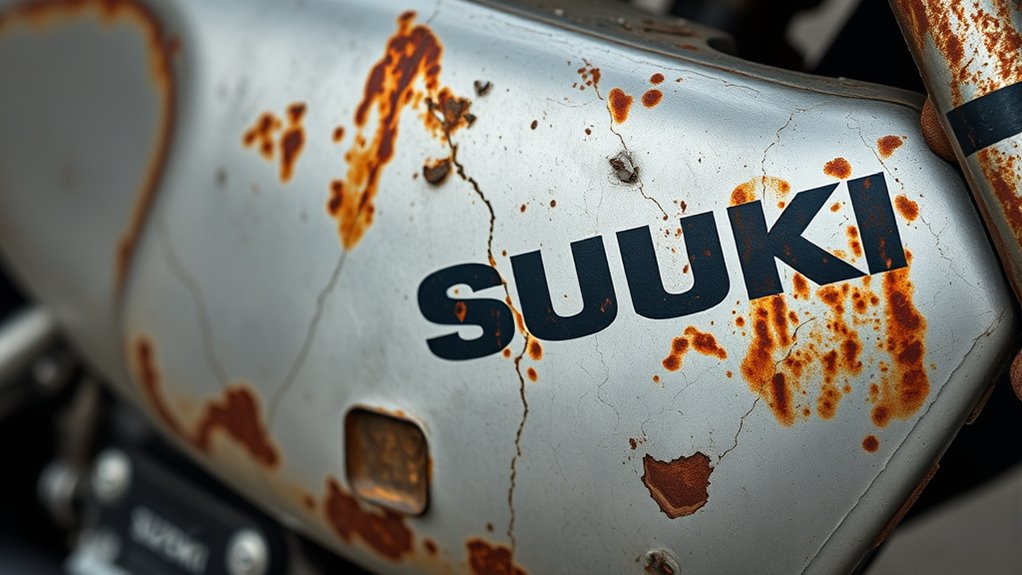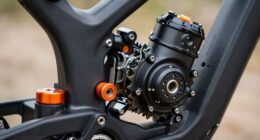Suzuki designs its vehicles with a strong focus on material fatigue resistance to guarantee long-term durability. They select advanced materials like high-strength steels and composites that resist deformation and fatigue. Rigorous durability testing simulates real-world stresses, helping identify weak points early. This approach helps extend the lifecycle of their vehicles, providing you with safety and reliability over time. To discover how Suzuki maintains such high standards, you’ll find more details if you keep exploring.
Key Takeaways
- Suzuki conducts durability testing to assess how their vehicle materials withstand cyclic loading and resist metal fatigue over time.
- Material selection in Suzuki vehicles focuses on high-strength steels and composites to improve fatigue resistance and longevity.
- The company analyzes metal deformation under repeated stresses to predict component lifespan and prevent early failures.
- Rigorous lifecycle testing ensures Suzuki vehicles maintain structural integrity, safety, and performance throughout their service life.
- Suzuki’s design strategies incorporate insights from fatigue analysis to enhance long-term reliability and customer confidence.

Understanding material fatigue and lifecycle is essential when evaluating Suzuki’s products. When you consider how their vehicles and components perform over time, it’s clear that metal deformation plays a vital role in determining longevity. Metal deformation occurs when a material is subjected to stresses beyond its elastic limit, causing permanent changes in shape or structure. Suzuki’s engineers focus heavily on understanding how repeated stresses contribute to this deformation, which ultimately impacts the vehicle’s durability. By analyzing how metals deform under various conditions, they can predict when parts are likely to weaken or fail, ensuring that designs are optimized for longevity. Additionally, incorporating cyclic loading analysis helps engineers anticipate how materials will behave under real-world stress patterns.
Durability testing is a core part of Suzuki’s development process. During these tests, components are subjected to simulated real-world conditions to observe how they hold up over extended periods and under different stress levels. These tests reveal insights into how materials respond to cyclic loading, revealing potential weak points before they reach the customer. For example, components that experience frequent stress cycles are tested for their resistance to metal fatigue, which is the progressive and localized structural damage that occurs under repeated loading. As you use Suzuki vehicles, you benefit from these rigorous durability tests, which help guarantee that parts resist fatigue and maintain their integrity over time. This proactive approach minimizes the risk of sudden failures and extends the overall lifecycle of the vehicle.
By understanding how metal deformation influences fatigue and lifecycle, Suzuki can improve material selection and design strategies. They use advanced materials that resist deformation and fatigue, such as high-strength steels and composites, which allow for lighter and more resilient structures. These materials are subjected to extensive durability testing to verify their performance under stress, ensuring they can withstand the rigors of everyday driving and harsh conditions. This focus on material science and testing means that Suzuki vehicles are built not just for immediate performance but for long-term reliability.
In the end, you can trust that Suzuki’s commitment to understanding material fatigue and lifecycle translates into vehicles that are durable, safe, and dependable. Their emphasis on analyzing metal deformation and conducting rigorous durability testing ensures that each component can endure the stresses of real-world use. Whether it’s a daily commute or a long road trip, Suzuki’s engineering prioritizes longevity, giving you peace of mind that your vehicle will stand the test of time.
Frequently Asked Questions
How Does Suzuki Test for Material Fatigue in Their Products?
You see, Suzuki tests for material fatigue through rigorous stress testing, where they simulate real-world conditions to identify potential failure points. They also assess corrosion resistance to guarantee durability over time. By applying repeated loads and environmental exposure, Suzuki ensures their products withstand long-term use, maintaining safety and reliability. This thorough testing process helps detect weaknesses early, so you can trust your Suzuki vehicle to perform consistently under diverse conditions.
What Innovative Materials Does Suzuki Use to Enhance Lifecycle Durability?
You’re in luck, because Suzuki harnesses cutting-edge composite alloys and nanomaterials to boost durability. These innovative materials act as the backbone of their products, giving them a longer life span and better resistance to wear and tear. By integrating these advanced materials, Suzuki guarantees their vehicles stand the test of time, proving that sometimes, you’ve got to think outside the box to stay ahead of the curve.
How Does Maintenance Impact the Fatigue Life of Suzuki Vehicles?
Maintenance substantially impacts the fatigue life of your Suzuki vehicle by addressing wear and tear early. Following recommended maintenance schedules helps prevent small issues from escalating, reducing stress on components and extending their durability. Regular inspections and timely repairs minimize fatigue-related failures, ensuring your vehicle remains safe and reliable longer. Neglecting maintenance accelerates wear and tear, shortening your Suzuki’s lifespan and increasing the risk of costly repairs down the road.
Are There Specific Environmental Factors That Accelerate Material Fatigue in Suzuki Models?
Exposure to harsh conditions, moisture, and salt accelerates material fatigue in your Suzuki models. Environmental stress, like extreme temperatures and UV radiation, also weakens corrosion resistance over time. These factors cause rust, cracking, and weakening of components, ultimately shortening your vehicle’s lifespan. To protect your car, regularly wash it, apply protective coatings, and park in shaded or sheltered areas, reducing environmental stress and preserving its durability.
What Future Technologies Is Suzuki Exploring to Improve Material Longevity?
Suzuki is exploring nanotechnology advancements and biodegradable composites to boost material longevity. These innovations help create stronger, more durable parts that resist fatigue and environmental damage. You’ll benefit from vehicles built with cutting-edge materials that last longer and are more eco-friendly. By integrating nanotech and biodegradable composites, Suzuki aims to reduce maintenance needs and improve overall vehicle lifespan, ensuring your driving experience remains reliable and sustainable over time.
Conclusion
Understanding material fatigue and lifecycle is like tending a garden—you need to monitor it regularly and care for it to keep everything thriving. By staying vigilant and addressing issues early, you can extend your Suzuki’s lifespan and ensure it performs reliably, just as a well-maintained garden flourishes. Remember, your attention is the sunlight that keeps your vehicle strong and durable, helping you enjoy a smooth ride for miles to come.









